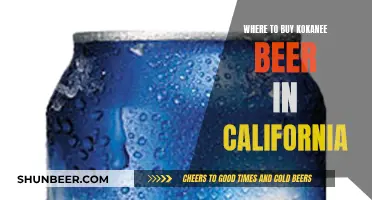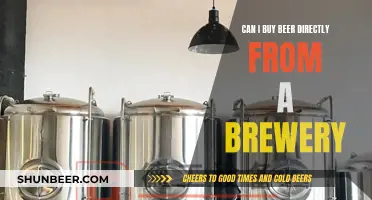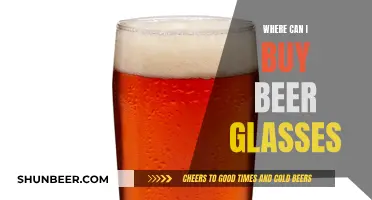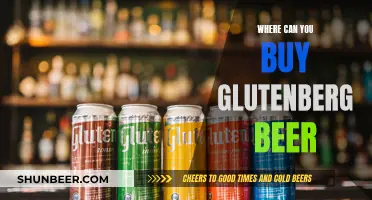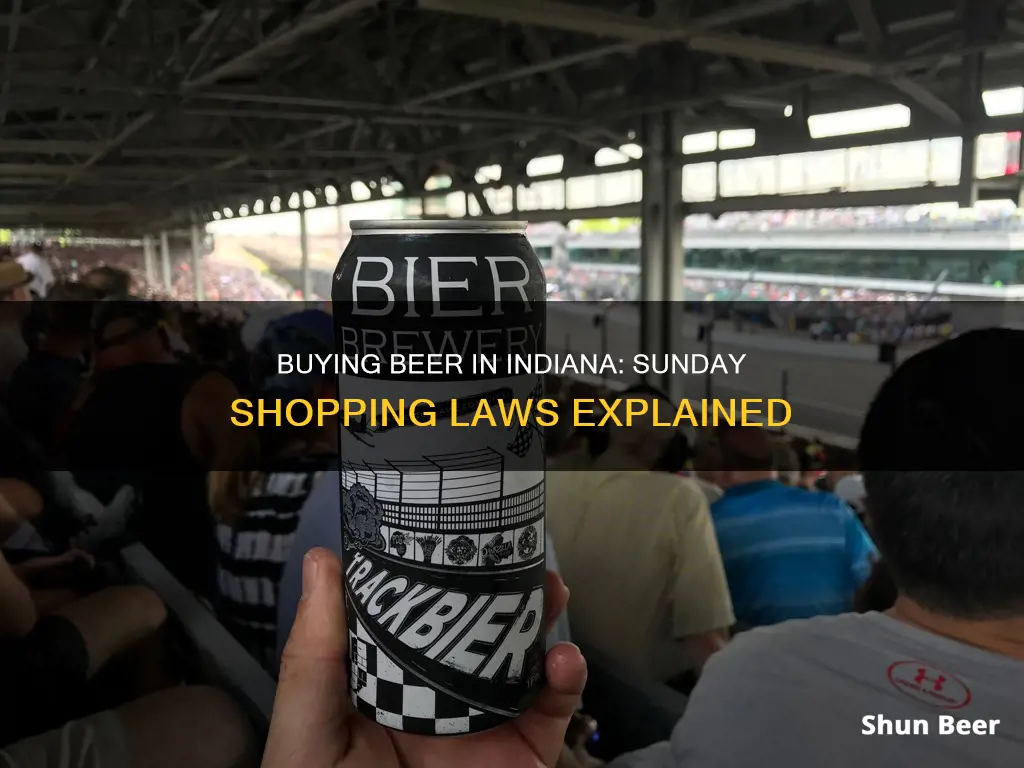
Indiana's alcohol laws have been described as \archaic and obsolete, at times contradictory, and often confusing. The state's laws are a legacy of Prohibition, and of its end, which allowed states to set their own rules. Until 2018, Indiana was one of nearly a dozen US states to ban all Sunday alcohol sales outside of bars and restaurants. That ban was lifted when Senate Bill 1 was signed by Gov. Eric Holcomb on February 28, 2018. Now, alcohol can be purchased in Indiana on Sundays from 12 pm to 8 pm.
| Characteristics | Values |
|---|---|
| Alcohol sales on Sundays | Allowed from noon to 8 pm |
| Alcohol sales during the week | Allowed from 7 am to 3 am |
| Alcohol sales on Election Day | Allowed since 2010 |
| Alcohol sales on Christmas Day | Allowed since 2015 |
| Alcohol sales in grocery stores | Allowed |
| Alcohol sales in gas stations | Allowed |
| Open container law | Allowed in vehicles if the passenger is paying for the ride or consuming alcohol in the living area of an RV |
| Happy hour | Banned |
| Carryout alcoholic beverages | Allowed since July 1st, 2021 |
What You'll Learn
- Beer can be bought in Indiana on Sundays from noon to 8 pm
- Liquor stores lobbied against Sunday beer sales
- Indiana's Sunday beer ban lasted for years due to economic reasons
- Indiana's alcohol laws have been described as confusing
- Indiana's alcohol laws are enforced by the Indiana Alcohol and Tobacco Commission

Beer can be bought in Indiana on Sundays from noon to 8 pm
Indiana's alcohol laws have changed over time, with legislators tweaking the rules to satisfy different groups. Since 2018, alcohol sales on Sundays have been permitted in the state.
The hours of noon to 8 pm on Sundays are the only time restrictions on alcohol sales in Indiana. Throughout the rest of the week, alcohol can be sold between 7 am and 3 am.
Indiana's alcohol laws are enforced by the Indiana Alcohol and Tobacco Commission, which has been in place since 1933, following the Repeal of Prohibition.
The state's alcohol laws have been influenced by various factors, including the legacy of Prohibition, economic considerations, and lobbying from different industries. For example, small liquor stores opposed Sunday sales to protect their market share and avoid the added costs of staffing on Sundays.
While Indiana now allows Sunday alcohol sales, there are still some unique aspects to its alcohol laws. For instance, liquor stores are the only retailers allowed to sell cold beer, and the state has a ban on "happy hour" discounts on alcoholic drinks.
Maryland Grocery Store Beer Buying Guide
You may want to see also

Liquor stores lobbied against Sunday beer sales
Indiana's alcohol laws have been described as archaic and obsolete, at times contradictory, and often confusing. The state's laws are a legacy of Prohibition, and of the end of Prohibition, which allowed states to set their own rules.
Until 2018, Indiana banned the sale of alcohol in stores on Sundays. This restriction was a remnant of the Prohibition-era "blue laws", which were largely supported by religious groups who wanted to preserve Sunday as a day of worship. However, the ban was maintained for years due to economic reasons, with religious objections rarely being part of the debate.
The biggest roadblock to lifting the ban was the liquor store industry, which sought to protect its market share from grocery stores, pharmacies, and big-box stores. With Sunday being the second busiest grocery shopping day of the week, liquor stores feared losing sales if consumers were able to stock up on beer, wine, and spirits during their regular Sunday shopping trips. Liquor stores also objected to the added costs of staffing on Sundays.
The liquor store lobby was firmly opposed to lifting the Sunday ban and spent significant amounts of money on lobbying efforts. They argued that allowing alcohol sales in grocery and convenience stores would put smaller liquor stores out of business and increase the possibility of drunken driving and minor consumption.
However, proponents of changing the law argued that it was a matter of convenience for consumers, who often have alcohol on their Sunday shopping lists. They also argued that alcohol is a controlled substance and that allowing sales in more locations would lead to easier access for minors.
In 2018, the Indiana Association of Beverage Retailers and the Indiana Retail Council rescinded their opposition to the bill, and it was signed into law. As of March 4, 2018, Indiana residents have been allowed to purchase alcohol from liquor stores, groceries, pharmacies, and convenience stores from noon to 8 pm on Sundays.
Kilkenny Beer: Where to Buy in the US?
You may want to see also

Indiana's Sunday beer ban lasted for years due to economic reasons
The biggest opposition to lifting the ban came from the liquor store industry, which sought to protect its market share from competition by grocery stores, pharmacies, and big-box stores. Liquor stores argued that allowing alcohol sales in these stores on Sundays would result in a loss of sales, as consumers would stock up on beer, wine, and spirits during their regular Sunday shopping trips. Additionally, liquor stores objected to the increased staffing costs associated with operating on Sundays.
Another factor contributing to the longevity of the ban was the influence of anti-alcohol organizations, which opposed providing consumers with an additional day to purchase alcohol. These organizations argued that the ban helped to reduce alcohol consumption and promoted public health and safety.
The debate over Indiana's Sunday beer ban was complex and involved a variety of stakeholders, including liquor stores, grocery stores, and public health advocates. Ultimately, the ban was lifted in 2018, with the passage of Senate Bill 1, allowing alcohol sales in convenience stores, grocers, and liquor stores from 12:00 pm to 8:00 pm on Sundays. This change marked a significant shift in Indiana's alcohol laws, providing greater accessibility to alcoholic beverages for consumers while also addressing the economic concerns of the liquor store industry.
Buying Beer on Easter Sunday in Michigan: What's Allowed?
You may want to see also

Indiana's alcohol laws have been described as confusing
Indiana's alcohol laws have been described as "'archaic and obsolete, at times contradictory, and often confusing". They are a legacy of Prohibition, and of the end of Prohibition, which allowed states to set their own rules. Over time, Indiana legislators have made changes to the laws to satisfy different groups.
One example of this is the ban on alcohol sales on Sundays, which was repealed in 2018. Before this, Indiana was one of nearly a dozen US states to ban all Sunday alcohol sales outside of bars and restaurants. This ban was a remnant of Prohibition-era "blue laws", which were largely supported by religious groups who wanted to preserve Sunday as a day of worship. However, in more recent times, the main group opposing alcohol sales on Sundays was small liquor stores, who wanted to protect their market share and avoid the added costs of staffing on Sundays.
Another example of Indiana's confusing alcohol laws is the restriction on cold beer sales. Indiana is the last state to regulate the sale of alcohol by temperature, with state law currently limiting the sale of cold beer for carryout to package liquor stores and breweries. This is due to the influence of the liquor store industry, which has considerable influence in the Indiana General Assembly. Liquor stores argue that cold beer sales are what differentiate them from other retailers and keep their businesses viable.
In addition, Indiana has a ban on "happy hour", despite allowing all-day drink specials. The ban on selling alcohol at reduced prices during a certain period of the day dates back to 1985 and is intended to prevent binge drinking. However, businesses argue that happy hour helps boost sales during slow times.
The complexity and contradictions of Indiana's alcohol laws can be attributed to the state's history and the influence of various interest groups. While some of these laws may seem confusing or outdated, they continue to shape the alcohol landscape in Indiana.
Blue Moon Beer: Where to Buy and Enjoy It
You may want to see also

Indiana's alcohol laws are enforced by the Indiana Alcohol and Tobacco Commission
The ATC plays a crucial role in ensuring compliance with Indiana's alcohol laws, which have been described as "archaic and obsolete, at times contradictory, and often confusing." These laws are a legacy of Prohibition and the subsequent end of Prohibition, which allowed states to set their own rules. Over time, Indiana legislators have made changes to these laws to satisfy various interests.
One significant change occurred on March 4, 2018, when Indiana residents were allowed to purchase alcohol on Sundays for the first time. This included carryout alcohol sales from liquor stores, groceries, pharmacies, and convenience stores, as well as restaurants. Prior to this change, Indiana was one of the many states that banned alcohol sales on Sundays, a restriction rooted in the Prohibition-era "blue laws" influenced by religious groups.
While the ATC enforces the state's alcohol laws, Indiana's laws regarding alcohol sales are quite varied. Alcohol can be sold between 7 a.m. and 3 a.m. every day of the week, but carryout alcohol sales from liquor, grocery, and convenience stores are limited to noon to 8 p.m. on Sundays. Indiana also allows drinking in public places and in vehicles if the passenger is paying for the ride or consuming alcohol in the living area of an RV. However, open containers in vehicles are generally prohibited.
The state has a ban on "happy hour," prohibiting retailers from selling alcoholic beverages at reduced prices during a specific portion of the day. Indiana also has unique laws regarding the temperature at which alcohol can be sold; it is currently the last state to regulate the sale of alcohol by temperature, allowing only package liquor stores and breweries to sell cold beer for carryout.
Buying Beer in Shelbyville: Sunday Kroger Run
You may want to see also
Frequently asked questions
Yes, you can buy beer in Indiana on Sunday. Since March 4, 2018, beer and other alcoholic drinks have been available for purchase from noon to 8 pm on Sundays at liquor stores, grocery stores, pharmacies, and convenience stores.
Alcohol sales are permitted from 7 am to 3 am throughout the week in Indiana. However, on Sundays, alcohol sales at liquor, grocery, and convenience stores are limited to noon to 8 pm.
The ban on Sunday alcohol sales in Indiana was a remnant of Prohibition-era "blue laws", influenced by religious groups wanting to preserve Sunday as a day of worship. Additionally, liquor stores wanted to protect their market share by avoiding sales on the second busiest grocery shopping day of the week.



